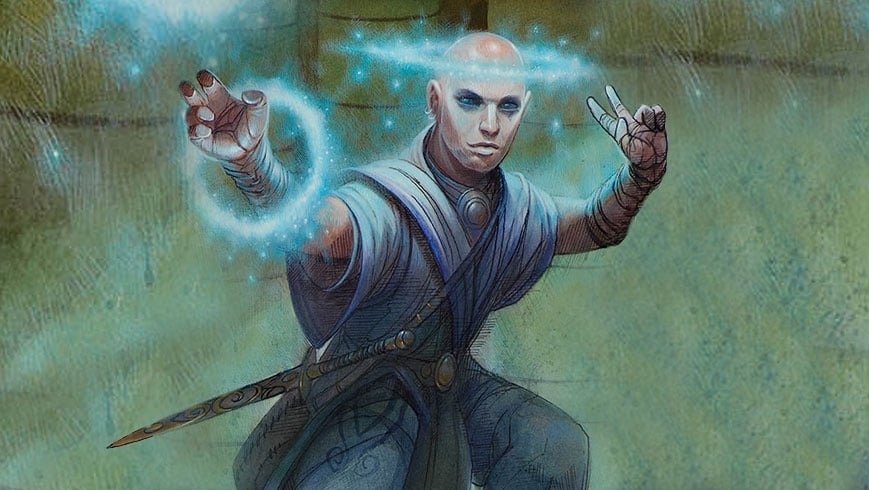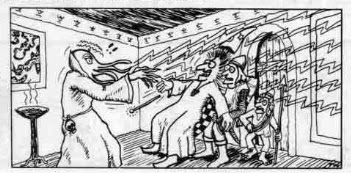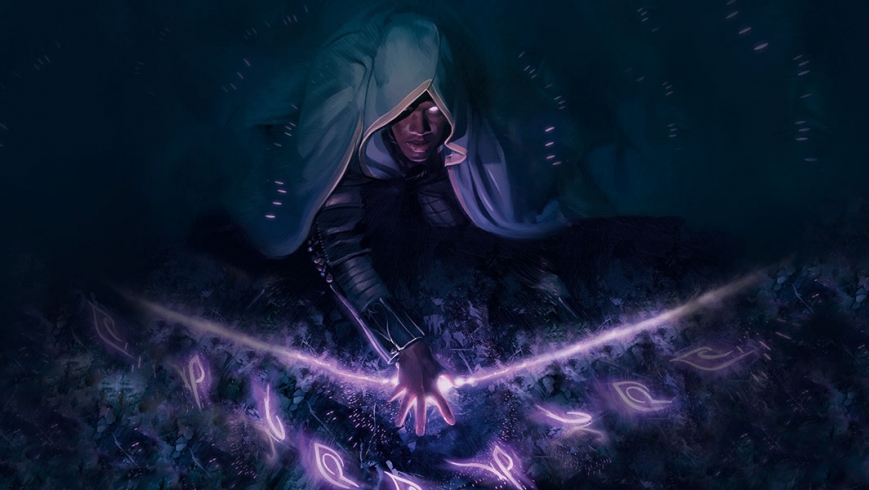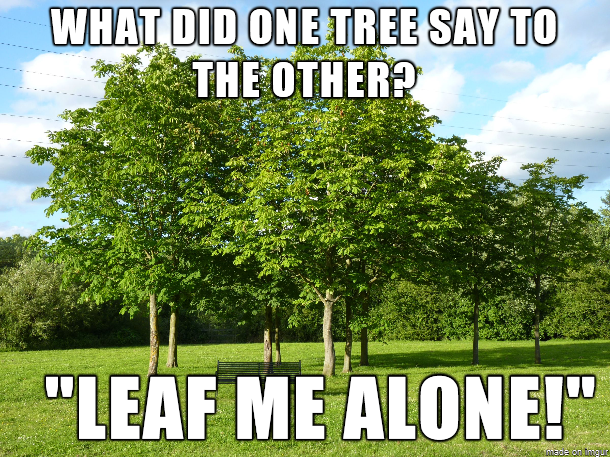D&D: Mind over Matter
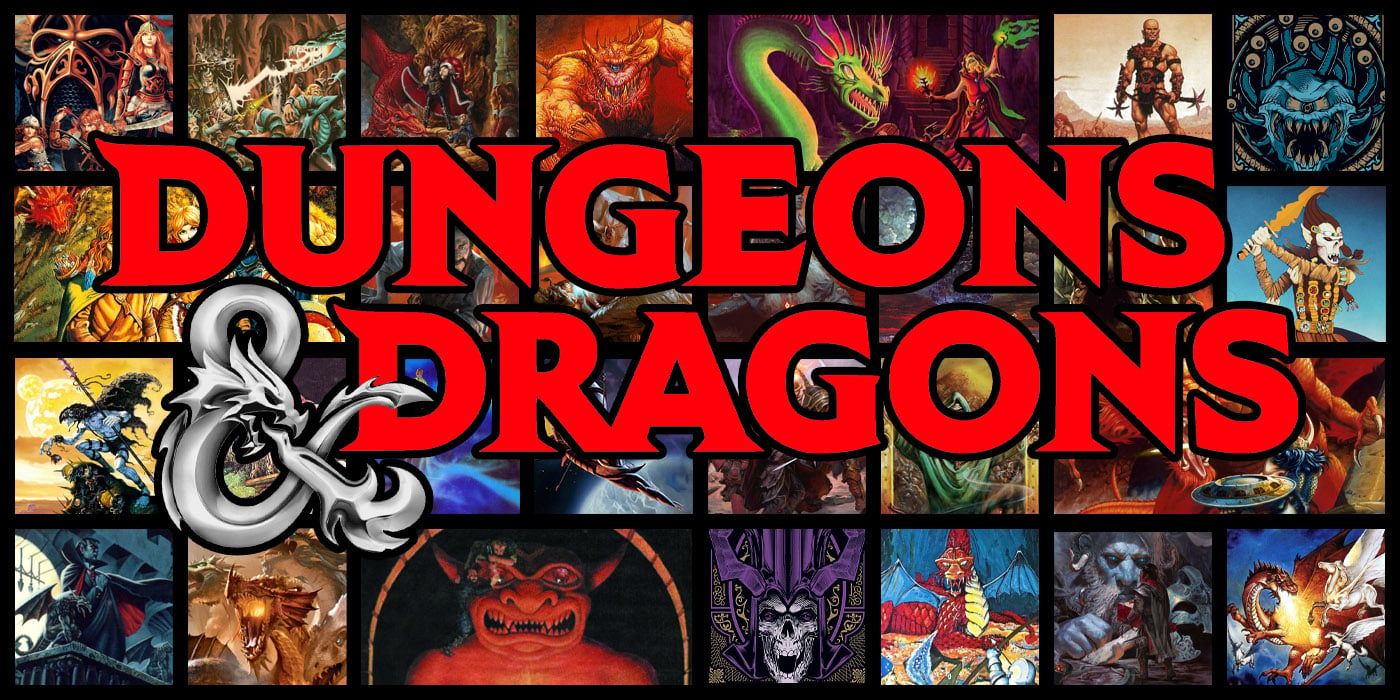

Today, we take an in-depth look at the new Psionic Rules…
This week’s Unearthed Arcana was a big one. They released the Mystic, a psionic class which we gave an overview of yesterday. But in order to make the Mystic work, they also had to release the rules for Psionics. So let’s dive in and take a look.
Psionics have been a part of D&D since basically the beginning. They’re not quite spells, but are similar to them. I mean, it honestly might have worked for Playtesting purposes to just have the Mystics have custom spell lists–but instead Wizards went all out. Psionics are separated out into Disciplines and Talents and every archetype for the Mystic has access to their own, except the Soul Knife who is busy doing Psylocke cosplay.
Psionic Talents
Psionic Talents are the Mystic’s Cantrips. They can be used at will, and every Mystic will eventually have access to four of them. All the classic cantrip hallmarks. There are even twelve of them to choose from with a wide variety of effects–though for the majority of a Mystic’s career, they’ll only have 2 or three, so choose carefully.
There are four direct attack Talents: Energy Beam, Mind Slam, Mind Thrust, and Psychic Hammer. They’re all save or take damage effects, so you’ll at the very least, never have to worry about missing with your attacks. But, it does make magic resistance very strong against you. ]
Mind Thrust is basically Fire Bolt except it requires an Int save instead of an attack roll. Aside from that, enemies take scaling d10 damage–though it’s Psychic damage, which is pretty nice. Very on-brand for the Mystic but also not many creatures are resistant/immune to it. This talent has the longest range and does the most potential damage.
Energy Beam has only a 90 ft. range, does a scaling d8 of acid/cold/fire/lightning/thunder damage, and requires a Dex save, which makes it a little less useful than Mind Thrust. But I feel like this one is meant for the Wu Jen, who have a lot of ways to enhance any elemental damage they do.
Mind Slam and Psychic Hammer do even less damage at a scaling d6, each, but creatures damaged by them are either knocked prone or pushed back, respectively.
The other Talents let you pull off shenanigans, which makes them more powerful than any attack cantrip, but you have to figure out how you’re gonna use them. Beacon is a Light spell centered on your body. Blade Meld fuses your melee weapon with your hand as a bonus action, so you can only be disarmed if you’re dis-armed. There’s the trio of trickery, Blind Spot, and Mystic Charm, and Delusion which respectively allow you to become invisible to a single target, charm a single target, or, my personal favorite implant a false belief in a single target. Although boringly, this is restricted to either a sound or image, you can’t go around implanting beliefs like ‘dogs can’t look up’ in the mind of one target. Even so, the possibilities are limitless. Light Step lets you move 10 feet faster and stand up once per round without taking up any movement. Which is great for any melee types. Mystic Hand is basically Mage Hand, only it specifically calls out spilling someone’s drink, so it’s idiosyncratically better.
And then there’s Mind Meld which I am less sure about. It lets you communicate telepathically with a willing creature–but you can already do that, willing or no, just by virtue of being a mystic of 2nd level or higher. I mean, sure, you also gain access to one of their memories or thoughts but I don’t know that this is worth being a separate “talent.”
Psionic Disciplines
Disciplines are the main course on the Mystic’s dinner plate. When you decide to use a Discipline, you choose from various effects to activate by spending Psi Points. The effects cost from 1-7 points, some have a variable cost you can use to juice up their strength. But the number of points you an spend is limited according to your level. Other than that, they function like spells, up to and including concentration. Every also Discipline also comes with a Focus ability, which are self-buffs that you allocate your Focus to receive. I really like the flexibility offered here–it makes Mystics able to adapt readily. Want to deal fire damage? Focus on Mastery of Fire and deal extra damage with any fire attacks. Want to be a heavy hitter? Brute Force is here for you.
Anyway, let’s take a look at the Disciplines. There are 40 in all folks. So roll up your sleeves and read on for a brief overview of them. But I think it’s worth pointing out that none of the Disciplines feels like it comes up short. They’re all powerful enough to feel like they could contribute in or out of combat. And they’re varied and interesting enough to make you want to try them out.
Any one of these Disciplines is going to be useful to a character. Some are a little more versatile than others, but I don’t think it’s a bad thing. On the whole, they do damage but not necessarily as well as some of the bigger blastery spells–but they have a fair number of unique effects as well.
Adaptive Body The endure elements discipline–this one lets you confer resistance or immunity to elemental damage, whether to yourself as a reaction, or to party members. Nothing super groundbreaking here, but it’s a good defensive option.
Aura Sight This one has a couple of unique powers. You can sense auras and learn a current target’s hp, vulnerabilities, and resistances, or see invisible and hidden creatures, or get advantage on Wisdom/Charisma checks against them.
AdvertisementBestial Form If you want to turn your body into a weird psychic mutant hybrid, this is the one for you. Its effects include a claw attack, and the ability to transform yourself to gain bestial traits like increased armor, flight, or water breathing.
Brute Force A strong contender for my favorite, simply because I love knockback effects. This one is here to pump *clap* you up. Increase the strength of a melee attack as a bonus action, give it knockback as a reaction, or just as part of your movement, spend points to Hulk Leap. Gish it up with this one.
Celerity Relive your Vampire the Masquerade days with Celerity. Gain increased movement, become invisible because you are so quick, or use a bonus action to Dodge, Dash, or make an Attack. If you, like Sonic, gotta go fast, this is the Discipline for you.
Corrosive Metabolism Become more toxic than an online debate with this one. This discipline lets you deal acid and poison damage, and provides you with area of effect attacks. Focusing on this discipline also gives you resistance to acid and poison.
Crown of Despair Brought to you by System of a Down, this Discipline focuses on battlefield control. Its effects include the ability to damage a target and prevent them from taking reactions, or dealing damage and reducing their speed to 0, or just incapacitating them. Set the pace of the fight with this one.
Crown of Disgust This one is all about fear and isolation. If you want to stop your foes from moving closer, and make them take damage for being near their friends, this is the Discipline for you. There’s an effect that deals 5d6 damage + 1d6 per creature within 5ft at the start of its turn. So make a pile-on even worse.
AdvertisementCrown of Rage Turn your enemies on one another with the effects of this one. Some of the effetcs damage your foes and make them attack the nearest creature, one allows you to designate a target and everyone nearby has to make a save or attack it–basically make your foes spend their turn attacking each other, not your party.
Diminution Pull an Ant Man and shrink down to avoid attacks, sneak around, or suddenly enlarge to knock people prone.
Giant Growth The other side of Diminution. Although much less broadly applicable. You can either turn Large or Huge with this Discipline, and gain extra reach and damage while you concentrate.
Intellect Fortress A classic Discipline. Defensively focused, this one lets you impose disadvantage when attacked, boost your saving throws, or provide advantage on certain saves to your party.
Iron Durability This one is all about physical defense, allowing you to buff your AC, or gain resistance to physical damage for either a turn or while you concentrate.
Mantle of Awe If you want to Charm others or subtly manipulate them, you’ve come to the right place. One of the effects I particularly enjoy is an ability which makes the Mystic so distracting that all other characters are invisible to the targets.
AdvertisementNot to be confused with a mantle of aww
Mantle of Command You might think this Discipline is all about mind control and commanding other creatures–but it’s actually about being a good commander for your allies. Like the Warlord in 4th Edition, this Discipline lets you buff an ally’s attack, or lets your party members make attacks at your behest.
Mantle of Courage Valor and Vigor are the watchwords here. This Discipline banishes fear (and makes your party immune to it), but also allows your allies to regain hp when they drop an enemy to 0, or, grants a Haste-like effect, allowing your allies to take an extra attack.
Mantle of Fear Another good Control Discipline. It’s all about causing fear in your enemies–and a few of them are potent fear effects, including one that doesn’t allow a saving throw until the target breaks line of sight with you.
Mantle of Fury This Discipline has Guts, because it is all about going Berserk. Give your allies bonuses to attack and damage rolls, grant charges as a reaction–really keep your whole party moving with this one.
Mantle of Joy A good Support Discipline, which lets you grant temporary hit points and add bonuses to saves and skill checks.
Mastery of Air A good self-buffing Discipline, the Mastery of Air lets you make a few attacks, grants flight, and lets you defend yourself. A solid choice for Wu Jen wanting to skirmish.
Mastery of Fire This pretty much does what it says on the tin. Blast your enemies with fire–it has some of the best damage-dealing effects available to Mystics, including a 1d10 per point single target damage spell, and an area of effect spell that’s not quite as good as Fireball, but knocks your enemies prone if they fail their save.
Mastery of Force More like Mastery of The Force, because this is the Discipline with all the Jedi powers. Push your enemies, use a little telekinesis, even Force choke them (well, crush them at any rate).
Mastery of Ice Cold damage is just one side of this Discipline–it’s also got some fantastic defensive options, including something similar to Wall of Ice, and the ability to create a sheet of ice on the ground in a 20 foot radius. So if you like Grease and understand why it’s one of the best spells in the game–this one is even better.
Mastery of Light and Darkness This one lets you create magical light and darkness, as you might expect, but you can also summon Shadows and blind your enemies with a beam of light.
Mastery of Water Strangely good at damaging foes, this one deals necrotic damage, or lets you pull enemies around with tidal forces as you surround them in water and ensure things go swimmingly.
Mastery of Weather Pretend you’re a Sith and shoot lightning at everything. Although you can also create a staircase of clouds, become a whirlwind, and teleport along a line of attack.
Mastery of Wood and Earth I really like how varied this one is. You can briefly animate a weapon, stop an enemy from using one, create a wall of wood, or beef up your own armor. Lots of flexibility.
Nomadic Arrow Become a psychic sniper and enhance your ranged attacks with this Discipline.
Nomadic Chameleon Never ever be seen again. This is all about invisibility and stealth, including a mass invisibility and a greater invisibility-like effect.
Nomadic Mind Build yourself a Mind Palace, Sherlock-style. This Discipline lets you send your mind to the “noosphere” which is a vast network of interrelated data you can use to identify objects, scry on people, locate creatures, and grant yourself extra skill proficiencies.
Nomadic Step Teleports, teleports, and more teleports. Short range teleports, defensive teleports, group teleports–as an action take you and up to 6 others up to a mile away–whatever kind of teleport you want, we’ve got it.
Precognition Weirdly enough, this one just makes Tom Cruise chase after you.
Psionic Restoration Heal your friends, revivify them, or remove harmful statuses–including the rare ability to remove effects that reduce hit point maximums. If you want to be a healer, this is the way to go.
Psionic Weapon This one is a good one for Soul Knives–it’s all about turning psionic energy into a weapon. Abilities include making a melee attack require a Dex save (for half damage) from your foe instead of an attack roll to hit, so you can guarantee some damage. And you can also just buff your attacks as you might expect.
Psychic Assault Shoot your enemies with mind bullets, and relive the glory days of older editions by using Ego Whip and Id Insinuation.
Psychic Disruption Help your Startup gain a lot of venture capital, and also damage and debilitate your foes, including the ability to Incapacitate a target for a round on a failed save.
Psychic Inquisiton Rip your enemies secrets straight from their brains–this one is ALSO the home of the MOdify Memory, where you can make your target believe that Dogs Can’t Look Up.
Psychic Phantoms Another Trickery type Discipline. I really like this one–you can impose disadvantage, or can take partial control of your enemies’ minds. One of the powers makes a target only able to use their attacks and abilities on their allies. Incredibly useful.
Telepathic Contact Do you want to be Professor X and have access to for real actual mind control? Because that’s what this one is all about.
Third Eye See everything. No really though, with access to Tremorsense, Truesight, and the ability to see through walls, this one lets you see what’s really going on.
Whew. We made it guys! Hope you enjoyed.
As always, let us know what you think. Do Psionics have a place in D&D? Do you think this version adds to or complicates the game?


